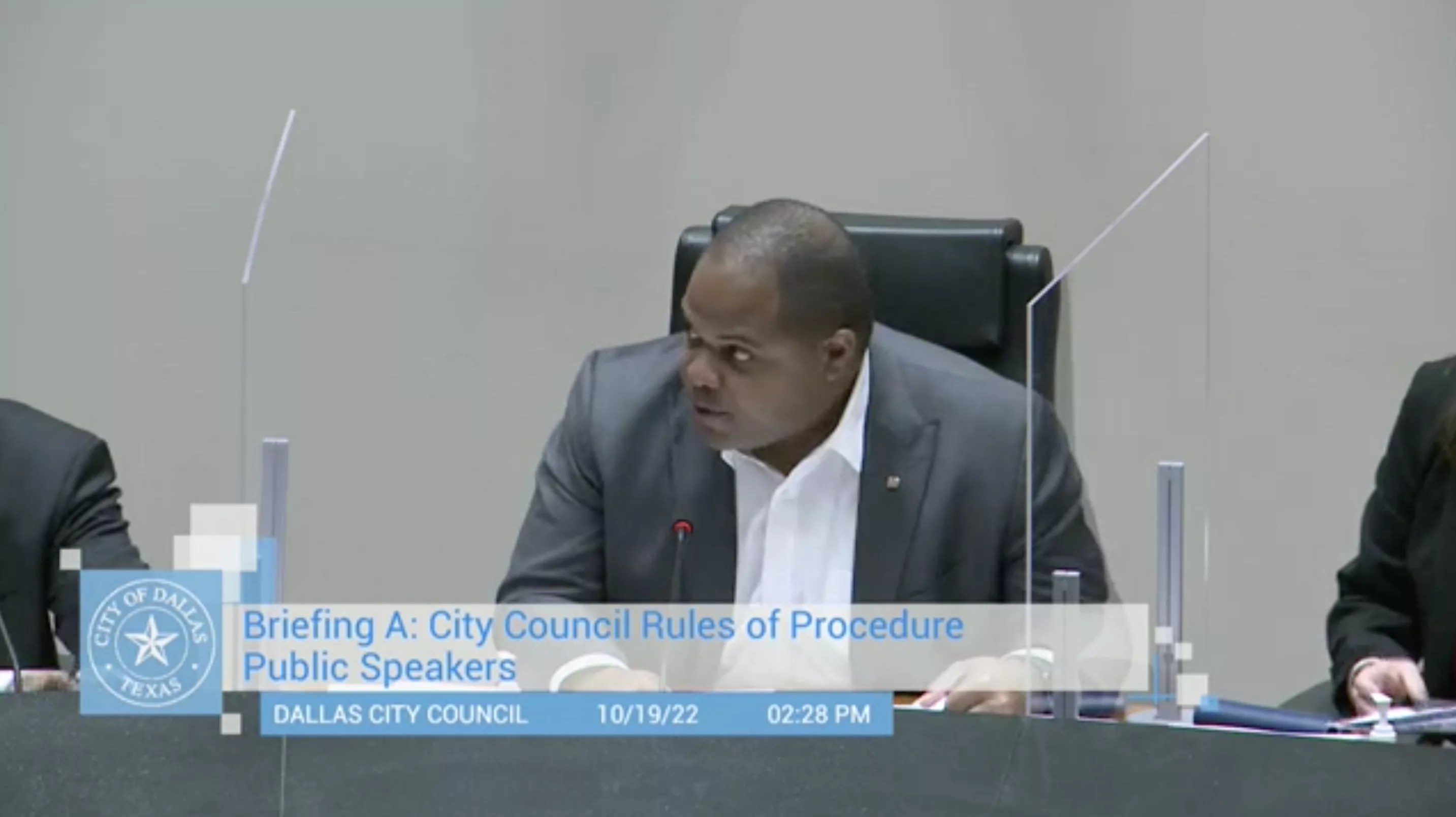
Screenshot, city of Dallas

Audio By Carbonatix
The people who line up to speak to the Dallas City Council during its open microphone sessions sometimes share their concerns about what’s going on in their part of town. Those comments may lead to actual changes in the city. Then there are the other speakers – the anti-fluoride crowd, the antisemites and those ready to unleash racist tirades or whatever else comes to mind during their few minutes in front of City Council.
That’s why Dallas is considering changes to how it handles public speakers. At the council’s meeting this week, Mayor Eric Johnson suggested getting rid of the open mic sessions, an option presented by city staff.
Public speakers at City Council meetings can generally be split into two groups – open microphone speakers and speakers on agenda items, including public hearings.
The distinction between the two categories is crucial in how the city regulates disruptive people. Texas law requires cities to give speakers an opportunity to be heard on an agenda item. Cal Estee, a Dallas senior assistant attorney, said courts have allowed cities to enforce topic limitations during discussions on agenda items. Topic limitations don’t violate the First Amendment because they are “reasonable regulations that serve the government’s interest in conducting an efficient and orderly meeting,” he said.
Neither Texas law nor the First Amendment requires an open microphone session during a public meeting, but if the city opens its forum up for anything-goes discussion, it can’t subsequently restrict speech based on the subject matter, Estee said.
“I don’t really want to be making decisions about what I think is rude behavior, essentially.” – Mayor Eric Johnson
Cities can take steps to control disruptive speakers. They can remove them for causing a disruption, but that’s not easily defined. If there are specific agenda items people are speaking about, a person could be removed for discussing an irrelevant topic, for example. But, during open microphone sessions, speakers can cause a disruption only by violating the rule of decorum, e.g., making personal, impertinent, profane or slanderous remarks, or becoming boisterous or exceeding the time allotted for them to speak. In these cases, the person in charge of the meeting has to warn the speaker before they’re removed. If they carry on with the disruption, Texas law allows the city to have them removed.
Whether someone is thrown out of a meeting is at the mayor’s discretion, and Johnson said Wednesday that he doesn’t like having to make those calls. Other cities are adopting rules to tackle disruptive speakers. These rules are more narrow and are meant to create a more objective standard to address disruptions and maintain order during city meetings.
Dallas may take similar steps.
The way it is now, five speakers are allowed to share comments with the City Council before it takes up its agenda. The remainder speak after every agenda item has been discussed.
The city has a few options. It can enforce the current rules more harshly. It could set aside specific time during the meeting for open microphone speakers on council days and schedule it as a recess. Dallas could also hold meetings on different days solely for open microphone speakers. These open microphone sessions could also be reserved for City Council briefing meetings. The city could also get rid of the open microphone session, or adopt something called a disruptive speaker standard. This standard could make the decision of whether someone is being disruptive more objective.
A committee was formed to look into these options and how people felt about them. Few seemed to support eliminating the open microphone speaker sessions. Instead, most were in favor of holding these sessions on City Council briefing days.
Johnson, who asked that the issue be examined, said he liked the idea of doing away with the open microphone sessions, even though it might look like the City Council was avoiding hearing from the public. He said that’s not the point. He wants to hear from residents. The point, he said, is making the meetings more efficient and taking away a process that requires him to exercise such discretion.
“That’s what I was trying to actually figure out, how we could get out of it because it requires me to make judgment calls about what’s discourteous to me, you know, what’s impertinent to me,” Johnson said.
He said some of these calls can make the other City Council members feel like he’s playing favorites. “It’s a mess,” Johnson said. “I don’t really want to be making decisions about what I think is rude behavior, essentially. … If we have open microphone speakers, we’re in the world of having to make those decisions.”
Restricting open microphone speakers completely would leave the agenda items for people to speak on, which already requires that comments are kept on topic, he argued.
Not everyone was on board with the idea. City Council member Cara Mendelsohn, for one, said she felt the process should stay the same because it’s “an important way for the public to be able to participate in local government.”
“We do see quite a bit of nonsense and some very crazy things … including this morning, songs, puppet shows from the anti-fluoride people, frequent tirades that are antisemitic,” Mendelsohn said. “But we’ve also learned some things that have helped us resolve some problems. We’ve helped residents who’ve come here looking for help – items that were not on the agenda. So, I view the public comment period as essential to accessible government, wouldn’t want to decrease the frequency or put limits on it.”
The City Council could vote on new rules for public speakers by the end of the year.